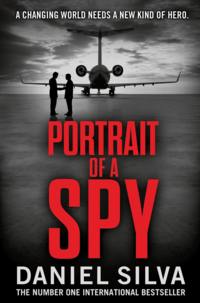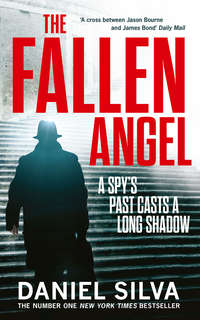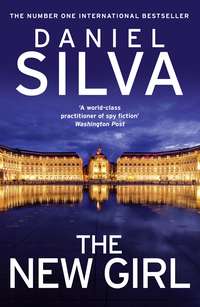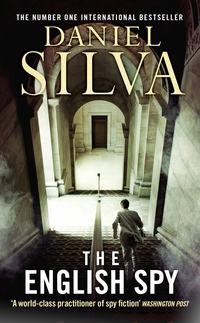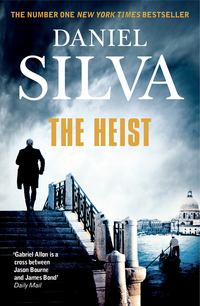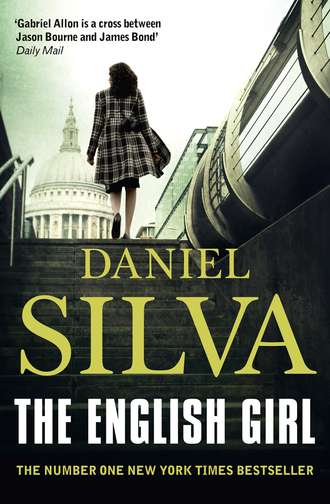
Полная версия
The English Girl
Which explained why Simon Hewitt, the prime minister’s director of communications, had not been sleeping well of late. The pattern of his insomnia never varied. Exhausted by the crushing daily grind of his job, he would fall asleep quickly, usually with a file propped on his chest, only to awaken after two or three hours. Once conscious, his mind would begin to race. After four years in government, he seemed incapable of focusing on anything but the negative. Such was the lot of a Downing Street press aide. In Simon Hewitt’s world, there were no triumphs, only disasters and near disasters. Like earthquakes, they ranged in severity from tiny tremors that were scarcely felt to seismic upheavals capable of toppling buildings and upending lives. Hewitt was expected to predict the coming calamity and, if possible, contain the damage. Lately, he had come to realize his job was impossible. In his darkest moments, this gave him a small measure of comfort.
He had once been a man to be reckoned with in his own right. As chief political columnist for the Times, Hewitt had been one of the most influential people in Whitehall. With but a few words of his trademark razor-edged prose, he could doom a government policy, along with the political career of the minister who had crafted it. Hewitt’s power had been so immense that no government would ever introduce an important initiative without first running it by him. And no politician dreaming of a brighter future would ever think about standing for a party leadership post without first securing Hewitt’s backing. One such politician had been Jonathan Lancaster, a former City lawyer from a safe seat in the London suburbs. At first, Hewitt didn’t think much of Lancaster; he was too polished, too good-looking, and too privileged to take seriously. But with time, Hewitt had come to regard Lancaster as a gifted man of ideas who wanted to remake his moribund political party and then remake his country. Even more surprising, Hewitt discovered he actually liked Lancaster, never a good sign. And as their relationship progressed, they spent less time gossiping about Whitehall political machinations and more time discussing how to repair Britain’s broken society. On election night, when Lancaster was swept to victory with the largest parliamentary majority in a generation, Hewitt was one of the first people he telephoned. “Simon,” he had said in that seductive voice of his. “I need you, Simon. I can’t do this alone.” Hewitt had then written glowingly of Lancaster’s prospects for success, knowing full well that in a few days’ time he would be working for him at Downing Street.
Now Hewitt opened his eyes slowly and stared contemptuously at the clock on his bedside table. It glowed 3:42, as if mocking him. Next to it were his three mobile devices, all fully charged for the media onslaught of the coming day. He wished he could so easily recharge his own batteries, but at this point no amount of sleep or tropical sunlight could repair the damage he had inflicted on his middle-aged body. He looked at Emma. As usual, she was sleeping soundly. Once, he might have pondered some lecherous way of waking her, but not now; their marital bed had become a frozen hearth. For a brief time, Emma had been seduced by the glamour of Hewitt’s job at Downing Street, but she had come to resent his slavish devotion to Lancaster. She saw the prime minister almost as a sexual rival and her hatred of him had reached an irrational fervor. “You’re twice the man he is, Simon,” she’d informed him last night before bestowing a loveless kiss on his sagging cheek. “And yet, for some reason, you feel the need to play the role of his handmaiden. Perhaps someday you’ll tell me why.”
Hewitt knew that sleep wouldn’t come again, not now, so he lay awake in bed and listened to the sequence of sounds that signaled the commencement of his day. The thud of the morning newspapers on his doorstep. The gurgle of the automatic coffeemaker. The purr of a government sedan in the street beneath his window. Rising carefully so as not to wake Emma, he pulled on his dressing gown and padded downstairs to the kitchen. The coffeemaker was hissing angrily. Hewitt prepared a cup, black for the sake of his expanding waistline, and carried it into the entrance hall. A blast of wet wind greeted him as he opened the door. The pile of newspapers was covered in plastic and lying on the welcome mat, next to a clay pot of dead geraniums. Stooping, he saw something else: a manila envelope, eight by ten, no markings, tightly sealed. Hewitt knew instantly it had not come from Downing Street; no one on his staff would dare to leave even the most trivial document outside his door. Therefore, it had to be something unsolicited. It was not unusual; his old colleagues in the press knew his Hampstead address and were forever leaving parcels for him. Small gifts for a well-timed leak. Angry rants over a perceived slight. A naughty rumor that was too sensitive to transmit via e-mail. Hewitt made a point of keeping up with the latest Whitehall gossip. As a former reporter, he knew that what was said behind a man’s back was oftentimes much more important than what was written about him on the front pages.
He prodded the envelope with his toe to make certain it contained no wiring or batteries, then placed it atop the newspapers and returned to the kitchen. After switching on the television and lowering the volume to a whisper, he removed the papers from the plastic wrapper and quickly scanned the front pages. They were dominated by Lancaster’s proposal to make British industry more competitive by lowering tax rates. The Guardian and the Independent were predictably appalled, but thanks to Hewitt’s efforts most of the coverage was positive. The other news from Whitehall was mercifully benign. No earthquakes. Not even a tremor.
After working his way through the so-called quality broadsheets, Hewitt quickly read the tabloids, which he regarded as a better barometer of British public opinion than any poll. Then, after refilling his coffee cup, he opened the anonymous envelope. Inside were three items: a DVD, a single sheet of A4 paper, and a photograph.
“Shit,” said Hewitt softly. “Shit, shit, shit.”

What transpired next would later be the source of much speculation and, for Simon Hewitt, a former political journalist who surely should have known better, no small amount of recrimination. Because instead of contacting London’s Metropolitan Police, as required by British law, Hewitt carried the envelope and its contents to his office at 12 Downing Street, located just two doors down from the prime minister’s official residence at Number Ten. After conducting his usual eight o’clock staff meeting, during which no mention was made of the items, he showed them to Jeremy Fallon, Lancaster’s chief of staff and political consigliere. Fallon was the most powerful chief of staff in British history. His official responsibilities included strategic planning and policy coordination across the various departments of government, which empowered him to poke his nose into any matter he pleased. In the press, he was often referred to as “Lancaster’s brain,” which Fallon rather liked and Lancaster privately resented.
Fallon’s reaction differed only in his choice of an expletive. His first instinct was to bring the material to Lancaster at once, but because it was a Wednesday he waited until Lancaster had survived the weekly gladiatorial death match known as Prime Minister’s Questions. At no point during the meeting did Lancaster, Hewitt, or Jeremy Fallon suggest handing the material over to the proper authorities. What was required, they agreed, was a person of discretion and skill who, above all else, could be trusted to protect the prime minister’s interests. Fallon and Hewitt asked Lancaster for the names of potential candidates, and he gave them only one. There was a family connection and, more important, an unpaid debt. Personal loyalty counted for much at times like these, said the prime minister, but leverage was far more practical.
Hence the quiet summons to Downing Street of Graham Seymour, the longtime deputy director of the British Security Service, otherwise known as MI5. Much later, Seymour would describe the encounter—conducted in the Study Room beneath a glowering portrait of Baroness Thatcher—as the most difficult of his career. He agreed to help the prime minister without hesitation because that was what a man like Graham Seymour did under circumstances such as these. Still, he made it clear that, were his involvement in the matter ever to become public, he would destroy those responsible.
Which left only the identity of the operative who would conduct the search. Like Lancaster before him, Graham Seymour had only one candidate. He did not share the name with the prime minister. Instead, using funds from one of MI5’s many secret operational accounts, he booked a seat on that evening’s British Airways flight to Tel Aviv. As the plane eased from the gate, he considered how best to make his approach. Personal loyalty counted for much at times like these, he thought, but leverage was far more practical.
3
JERUSALEM
IN THE HEART of Jerusalem, not far from the Ben Yehuda Mall, was a quiet, leafy lane known as Narkiss Street. The apartment house at Number Sixteen was small, just three stories in height, and was partially concealed behind a sturdy limestone wall and a towering eucalyptus tree growing in the front garden. The uppermost flat differed from the others in the building only in that it had once been owned by the secret intelligence service of the State of Israel. It had a spacious sitting room, a tidy kitchen filled with modern appliances, a formal dining room, and two bedrooms. The smaller of the two bedrooms, the one meant for a child, had been painstakingly converted into a professional artist’s studio. But Gabriel still preferred to work in the sitting room, where the cool breeze from the open French doors carried away the stench of his solvents.
At the moment, he was using a carefully calibrated solution of acetone, alcohol, and distilled water, first taught to him in Venice by the master art restorer Umberto Conti. The mixture was strong enough to dissolve the surface contaminants and the old varnish but would do no harm to the artist’s original brushwork. Now he dipped a hand-fashioned cotton swab into the solution and twirled it gently over the upturned breast of Susanna. Her gaze was averted and she seemed only vaguely aware of the two lecherous village elders watching her bathe from beyond her garden wall. Gabriel, who was unusually protective of women, wished he could intervene and spare her the trauma of what was to come—the false accusations, the trial, the death sentence. Instead, he worked the cotton swab gently over the surface of her breast and watched as her yellowed skin turned a luminous white.
When the swab became soiled, Gabriel placed it in an airtight flask to trap the fumes. As he prepared another, his eyes moved slowly over the surface of the painting. At present, it was attributed only to a follower of Titian. But the painting’s current owner, the renowned London art dealer Julian Isherwood, believed it had come from the studio of Jacopo Bassano. Gabriel concurred—indeed, now that he had exposed some of the brushwork, he saw evidence of the master himself, especially in the figure of Susanna. Gabriel knew Bassano’s style well; he had studied his paintings extensively while serving his apprenticeship and had once spent several months in Zurich restoring an important Bassano for a private collector. On the final night of his stay, he had killed a man named Ali Abdel Hamidi in a wet alleyway near the river. Hamidi, a Palestinian master terrorist with much Israeli blood on his hands, had been posing as a playwright, and Gabriel had given him a death worthy of his literary pretensions.
Gabriel dipped the new swab into the solvent mixture, but before he could resume work he heard the familiar rumble of a heavy car engine in the street. He stepped onto the terrace to confirm his suspicions and then opened the front door an inch. A moment later Ari Shamron was perched atop a wooden stool at Gabriel’s side. He wore khaki trousers, a white oxford cloth shirt, and a leather jacket with an unrepaired tear in the left shoulder. His ugly spectacles shone with the light of Gabriel’s halogen work lamps. His face, with its deep cracks and fissures, was set in an expression of profound distaste.
“I could smell those chemicals the instant I stepped out of the car,” Shamron said. “I can only imagine the damage they’ve done to your body after all these years.”
“Rest assured it’s nothing compared to the damage you’ve done,” Gabriel replied. “I’m surprised I can still hold a paintbrush.”
Gabriel placed the moistened swab against the flesh of Susanna and twirled it gently. Shamron frowned at his stainless steel wristwatch, as though it were no longer keeping proper time.
“Something wrong?” asked Gabriel.
“I’m just wondering how long it’s going to take you to offer me a cup of coffee.”
“You know where everything is. You practically live here now.”
Shamron muttered something in Polish about the ingratitude of children. Then he nudged himself off the stool and, leaning heavily on his cane, made his way into the kitchen. He managed to fill the teakettle with tap water but appeared perplexed by the various buttons and dials on the stove. Ari Shamron had twice served as the director of Israel’s secret intelligence service and before that had been one of its most decorated field officers. But now, in old age, he seemed incapable of the most basic of household tasks. Coffeemakers, blenders, toasters: these were a mystery to him. Gilah, his long-suffering wife, often joked that the great Ari Shamron, if left to his own devices, would find a way to starve in a kitchen filled with food.
Gabriel ignited the stove and then resumed his work. Shamron stood in the French doors, smoking. The stench of his Turkish tobacco soon overwhelmed the pungent odor of the solvent.
“Must you?” asked Gabriel.
“I must,” said Shamron.
“What are you doing in Jerusalem?”
“The prime minister wanted a word.”
“Really?”
Shamron glared at Gabriel through a cloud of blue-gray smoke. “Why are you surprised the prime minister would want to see me?”
“Because—”
“I am old and irrelevant?” Shamron asked, cutting him off.
“You are unreasonable, impatient, and at times irrational. But you have never been irrelevant.”
Shamron nodded in agreement. Age had given him the ability to at least see his own shortcomings, even if it had robbed him of the time needed to remedy them.
“How is he?” asked Gabriel.
“As you might imagine.”
“What did you talk about?”
“Our conversation was wide ranging and frank.”
“Does that mean you yelled at each other?”
“I’ve only yelled at one prime minister.”
“Who?” asked Gabriel, genuinely curious.
“Golda,” answered Shamron. “It was the day after Munich. I told her we had to change our tactics, that we had to terrorize the terrorists. I gave her a list of names, men who had to die. Golda wanted none of it.”
“So you yelled at her?”
“It was not one of my finer moments.”
“What did she do?”
“She yelled back, of course. But eventually she came around to my way of thinking. After that, I put together another list of names, the names of the young men I needed to carry out the operation. All of them agreed without hesitation.” Shamron paused, and then added, “All but one.”
Gabriel silently placed the soiled swab into the airtight flask. It trapped the noxious fumes of the solvent but not the memory of his first encounter with the man they called the Memuneh, the one in charge. It had taken place just a few hundred yards from where he stood now, on the campus of the Bezalel Academy of Arts and Design. Gabriel had just left a lecture on the paintings of Viktor Frankel, the noted German Expressionist who also happened to be his maternal grandfather. Shamron was waiting for him at the edge of a sunbaked courtyard, a small iron bar of a man with hideous spectacles and teeth like a steel trap. As usual, he was well prepared. He knew that Gabriel had been raised on a dreary agricultural settlement in the Valley of Jezreel and that he had a passionate hatred of farming. He knew that Gabriel’s mother, a gifted artist in her own right, had managed to survive the death camp at Birkenau but was no match for the cancer that ravaged her body. He knew, too, that Gabriel’s first language was German and that it remained the language of his dreams. It was all in the file he was holding in his nicotine-stained fingers. “The operation will be called Wrath of God,” he had said that day. “It’s not about justice. It’s about vengeance, pure and simple—vengeance for the eleven innocent lives lost at Munich.” Gabriel had told Shamron to find someone else. “I don’t want someone else,” Shamron had responded. “I want you.”
For the next three years, Gabriel and the other Wrath of God operatives stalked their prey across Europe and the Middle East. Armed with a .22-caliber Beretta, a soft-spoken weapon suitable for killing at close range, Gabriel personally assassinated six members of Black September. Whenever possible he shot them eleven times, one bullet for each Israeli butchered in Munich. When he finally returned home, his temples were the color of ash and his face was that of a man twenty years his senior. No longer able to produce original work, he went to Venice to study the craft of restoration. Then, when he was rested, he went back to work for Shamron. In the years that followed, he carried out some of the most fabled operations in the history of Israeli intelligence. Now, after many years of restless wandering, he had finally returned to Jerusalem. No one was more pleased by this than Shamron, who loved Gabriel as a son and treated the apartment on Narkiss Street as though it were his own. Once, Gabriel might have chafed under the pressure of Shamron’s constant presence, but no more. The great Ari Shamron was eternal, but the vessel in which his spirit resided would not last forever.
Nothing had done more damage to Shamron’s health than his relentless smoking. It was a habit he acquired as a young man in eastern Poland, and it had grown worse after he had come to Palestine, where he fought in the war that led to Israel’s independence. Now, as he described his meeting with the prime minister, he flicked open his old Zippo lighter and used it to ignite another one of his foul-smelling cigarettes.
“The prime minister is on edge, more so than usual. I suppose he has a right to be. The great Arab Awakening has plunged the entire region into chaos. And the Iranians are growing closer to realizing their nuclear dreams. At some point soon, they will enter a zone of immunity, making it impossible for us to act militarily without the help of the Americans.” Shamron closed his lighter with a snap and looked at Gabriel, who had resumed work on the painting. “Are you listening to me?”
“I’m hanging on your every word.”
“Prove it.”
Gabriel repeated Shamron’s last statement verbatim. Shamron smiled. He regarded Gabriel’s flawless memory as one of his finest accomplishments. He twirled the Zippo lighter in his fingertips. Two turns to the right, two turns to the left.
“The problem is that the American president refuses to lay down any hard-and-fast red lines. He says he will not allow the Iranians to build nuclear weapons. But that declaration is meaningless if the Iranians have the capability to build them in a short period of time.”
“Like the Japanese.”
“The Japanese aren’t ruled by apocalyptic Shia mullahs,” Shamron said. “If the American president isn’t careful, his two most important foreign policy achievements will be a nuclear Iran and the restoration of the Islamic caliphate.”
“Welcome to the post-American world, Ari.”
“Which is why I think we’re foolish to leave our security in their hands. But that’s not the prime minister’s only problem,” Shamron added. “The generals aren’t sure they can destroy enough of the program to make a military strike effective. And King Saul Boulevard, under the tutelage of your friend Uzi Navot, is telling the prime minister that a unilateral war with the Persians would be a catastrophe of biblical proportions.”
King Saul Boulevard was the address of Israel’s secret intelligence service. It had a long and deliberately misleading name that had very little to do with the true nature of its work. Even retired agents like Gabriel and Shamron referred to it as “the Office” and nothing else.
“Uzi is the one who sees the raw intelligence every day,” said Gabriel.
“I see it, too. Not all of it,” Shamron added hastily, “but enough to convince me that Uzi’s calculations about how much time we have might be flawed.”
“Math was never Uzi’s strong suit. But when he was in the field, he never made mistakes.”
“That’s because he rarely put himself in a position where it was possible to make a mistake.” Shamron lapsed into silence and watched the wind moving in the eucalyptus tree beyond the balustrade of Gabriel’s terrace. “I’ve always said that a career without controversy is not a proper career at all. I’ve had my share, and so have you.”
“And I have the scars to prove it.”
“And the accolades, too,” Shamron said. “The prime minister is concerned the Office is too cautious when it comes to Iran. Yes, we’ve inserted viruses into their computers and eliminated a handful of their scientists, but nothing has gone boom lately. The prime minister would like Uzi to produce another Operation Masterpiece.”
Masterpiece was the code name for a joint Israeli, American, and British operation that resulted in the destruction of four secret Iranian enrichment facilities. It had occurred on Uzi Navot’s watch, but within the corridors of King Saul Boulevard, it was regarded as one of Gabriel’s finest hours.
“Opportunities like Masterpiece don’t come along every day, Ari.”
“That’s true,” Shamron conceded. “But I’ve always believed that most opportunities are earned rather than bestowed. And so does the prime minister.”
“Has he lost confidence in Uzi?”
“Not yet. But he wanted to know whether I’d lost mine.”
“What did you say?”
“What choice did I have? I was the one who recommended him for the job.”
“So you gave him your blessing?”
“It was conditional.”
“How so?”
“I reminded the prime minister that the person I really wanted in the job wasn’t interested.” Shamron shook his head slowly. “You are the only man in the history of the Office who has turned down a chance to be the director.”
“There’s a first for everything, Ari.”
“Does that mean you might reconsider?”
“Is that why you’re here?”
“I thought you might enjoy the pleasure of my company,” Shamron countered. “And the prime minister and I were wondering whether you might be willing to do a bit of outreach to one of our closest allies.”
“Which one?”
“Graham Seymour dropped into town unannounced. He’d like a word.”
Gabriel turned to face Shamron. “A word about what?” he asked after a moment.
“He wouldn’t say, but apparently it’s urgent.” Shamron walked over to the easel and squinted at the pristine patch of canvas where Gabriel had been working. “It looks new again.”
“That’s the point.”
“Is there any chance you could do the same for me?”
“Sorry, Ari,” said Gabriel, touching Shamron’s deeply crevassed cheek, “but I’m afraid you’re beyond repair.”
4
KING DAVID HOTEL, JERUSALEM
ON THE AFTERNOON of July 22, 1946, the extremist Zionist group known as the Irgun detonated a large bomb in the King David Hotel, headquarters of all British military and civilian forces in Palestine. The attack, a reprisal for the arrest of several hundred Jewish fighters, killed ninety-one people, including twenty-eight British subjects who had ignored a telephone warning to evacuate the hotel. Though universally condemned, the bombing would quickly prove to be one of the most effective acts of political violence ever committed. Within two years, the British had retreated from Palestine, and the modern State of Israel, once an almost unimaginable Zionist dream, was a reality.



